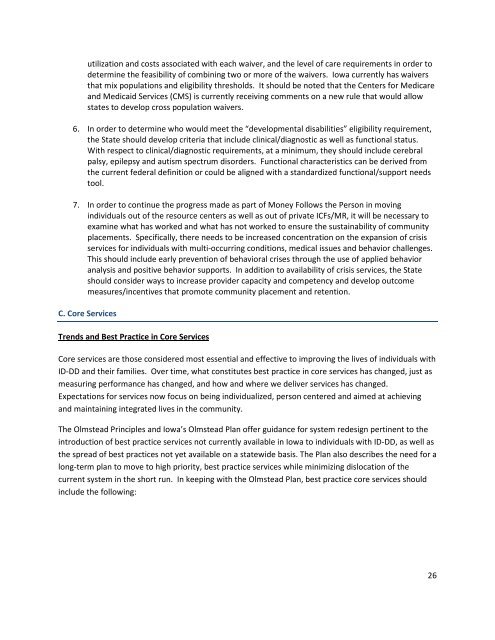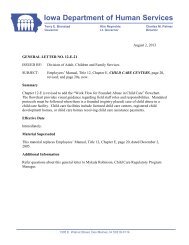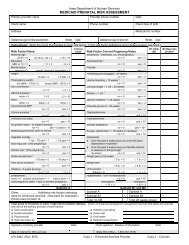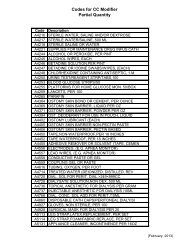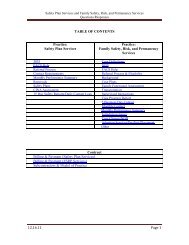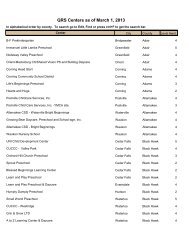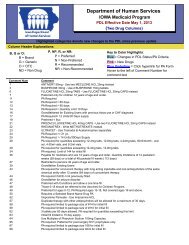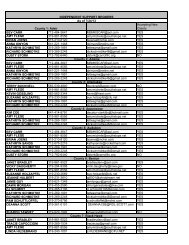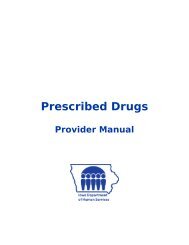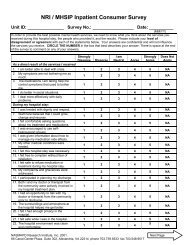Iowa Mental Health and Disability Services System Redesign Interim ...
Iowa Mental Health and Disability Services System Redesign Interim ...
Iowa Mental Health and Disability Services System Redesign Interim ...
- No tags were found...
You also want an ePaper? Increase the reach of your titles
YUMPU automatically turns print PDFs into web optimized ePapers that Google loves.
utilization <strong>and</strong> costs associated with each waiver, <strong>and</strong> the level of care requirements in order to<br />
determine the feasibility of combining two or more of the waivers. <strong>Iowa</strong> currently has waivers<br />
that mix populations <strong>and</strong> eligibility thresholds. It should be noted that the Centers for Medicare<br />
<strong>and</strong> Medicaid <strong>Services</strong> (CMS) is currently receiving comments on a new rule that would allow<br />
states to develop cross population waivers.<br />
6. In order to determine who would meet the “developmental disabilities” eligibility requirement,<br />
the State should develop criteria that include clinical/diagnostic as well as functional status.<br />
With respect to clinical/diagnostic requirements, at a minimum, they should include cerebral<br />
palsy, epilepsy <strong>and</strong> autism spectrum disorders. Functional characteristics can be derived from<br />
the current federal definition or could be aligned with a st<strong>and</strong>ardized functional/support needs<br />
tool.<br />
7. In order to continue the progress made as part of Money Follows the Person in moving<br />
individuals out of the resource centers as well as out of private ICFs/MR, it will be necessary to<br />
examine what has worked <strong>and</strong> what has not worked to ensure the sustainability of community<br />
placements. Specifically, there needs to be increased concentration on the expansion of crisis<br />
services for individuals with multi-occurring conditions, medical issues <strong>and</strong> behavior challenges.<br />
This should include early prevention of behavioral crises through the use of applied behavior<br />
analysis <strong>and</strong> positive behavior supports. In addition to availability of crisis services, the State<br />
should consider ways to increase provider capacity <strong>and</strong> competency <strong>and</strong> develop outcome<br />
measures/incentives that promote community placement <strong>and</strong> retention.<br />
C. Core <strong>Services</strong><br />
Trends <strong>and</strong> Best Practice in Core <strong>Services</strong><br />
Core services are those considered most essential <strong>and</strong> effective to improving the lives of individuals with<br />
ID-DD <strong>and</strong> their families. Over time, what constitutes best practice in core services has changed, just as<br />
measuring performance has changed, <strong>and</strong> how <strong>and</strong> where we deliver services has changed.<br />
Expectations for services now focus on being individualized, person centered <strong>and</strong> aimed at achieving<br />
<strong>and</strong> maintaining integrated lives in the community.<br />
The Olmstead Principles <strong>and</strong> <strong>Iowa</strong>’s Olmstead Plan offer guidance for system redesign pertinent to the<br />
introduction of best practice services not currently available in <strong>Iowa</strong> to individuals with ID-DD, as well as<br />
the spread of best practices not yet available on a statewide basis. The Plan also describes the need for a<br />
long-term plan to move to high priority, best practice services while minimizing dislocation of the<br />
current system in the short run. In keeping with the Olmstead Plan, best practice core services should<br />
include the following:<br />
26


